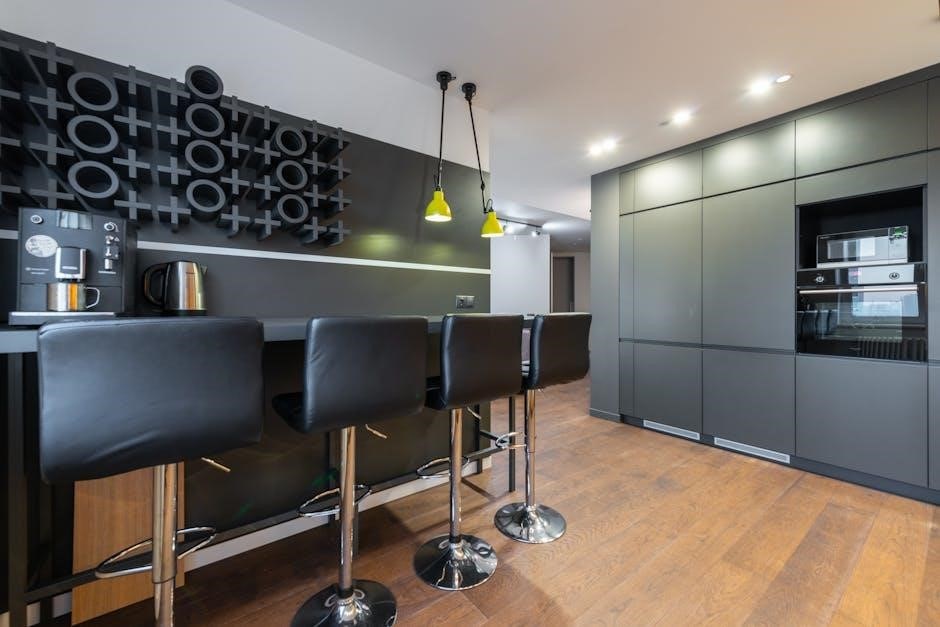assisted living marketing plan pdf
Download our FREE Assisted Living Marketing Plan PDF! Discover expert strategies to attract residents and grow your community. Get the ultimate guide now!
An effective assisted living marketing plan is essential for attracting residents and establishing a strong presence in the senior care industry․ It outlines strategies to reach target audiences, build brand awareness, and differentiate your facility from competitors, ensuring sustainable growth and resident satisfaction․
Understanding the Purpose and Importance
A well-crafted assisted living marketing plan is crucial for reaching target audiences, building brand identity, and differentiating your facility in a competitive market․ It ensures consistent messaging, highlights unique services, and addresses the needs of potential residents․ By focusing on privacy, quality care, and community engagement, the plan establishes trust and credibility, ultimately driving occupancy rates and long-term success in the senior care industry;
Key Components of an Effective Plan
An effective assisted living marketing plan includes target market identification, branding, digital strategies, referral programs, and community outreach․ It emphasizes website optimization, social media engagement, and paid advertising to enhance online presence․ Budget allocation, ROI measurement, and competitor analysis are also critical․ The plan should highlight unique selling propositions, ensuring consistent messaging and fostering trust to attract potential residents and maintain occupancy rates in a competitive market․

Target Market Identification
Identifying the target market involves understanding demographics, such as age and health needs, and psychographics, like lifestyle preferences, to tailor marketing strategies effectively for assisted living facilities․
Demographics and Psychographics of Potential Residents
Potential residents are typically seniors aged 65+, requiring assistance with daily tasks․ They often value safety, comfort, and social engagement․ Psychographically, they seek dignity, independence, and access to healthcare․ Understanding these demographics and psychographics helps tailor marketing strategies to their needs, preferences, and expectations, ensuring effective communication and attraction of the target audience for assisted living facilities․
Analyzing Competitors and Market Trends
Analyzing competitors and market trends is crucial for identifying opportunities and threats․ Competitors’ strategies reveal industry standards and gaps to exploit․ Market trends, such as increasing demand for personalized care and digital engagement, shape consumer expectations․ By understanding these dynamics, facilities can differentiate themselves, refine offerings, and position themselves effectively in a competitive landscape, ensuring relevance and appeal to potential residents․

Marketing Strategies for Assisted Living Facilities
Effective strategies include targeted advertising, referral programs, and community outreach to attract residents and build credibility, ensuring differentiation in a competitive senior care market․
Integrated Marketing Approach
An integrated marketing approach combines online and offline strategies to create a cohesive brand experience․ This includes digital advertising, social media engagement, content marketing, and community outreach․ By aligning all channels, facilities can ensure consistent messaging, build trust, and reach a wider audience․ This holistic strategy maximizes visibility, fosters connections, and drives inquiries, ultimately attracting potential residents and their families effectively․
Best Practices for Attracting Residents
Highlighting unique selling points, such as amenities and care quality, is crucial․ Showcase testimonials and offer tours to build trust․ Tailored messaging for decision-makers, like family members, ensures relevance; Consistent follow-up and personalized communication foster connections․ Emphasizing community engagement and educational resources also attracts potential residents, demonstrating your facility’s commitment to their well-being and quality of life․

Digital Marketing Tools
Digital marketing tools are essential for promoting assisted living facilities online․ They include SEO, social media, and paid ads․ These tools help attract residents and enhance visibility, ensuring a strong online presence in the competitive senior care market․
Website Optimization and Online Presence
Optimizing your website is crucial for attracting potential residents․ Ensure your site is user-friendly, mobile-friendly, and includes clear information about services; Use SEO techniques to improve visibility in search results․ Showcase facility amenities and testimonials to build trust․ Provide easy navigation and a clear call-to-action, such as scheduling a tour․ Regularly update content to keep visitors engaged and informed about your assisted living offerings․
Role of Social Media and Paid Advertising
Social media platforms like Facebook and Instagram are key for engaging target audiences and building brand awareness․ Paid advertising, such as Google Ads and social media ads, helps reach potential residents actively searching for senior care options․ These tools drive website traffic, generate leads, and support sales strategies by targeting demographics aligned with your facility’s services and mission․

Referral and Partnership Programs
Referral and partnership programs are crucial for assisted living facilities, fostering relationships with healthcare providers and community organizations to enhance credibility and generate high-quality leads․
Building Relationships with Referral Sources
Building strong relationships with referral sources, such as healthcare providers and social workers, is vital for generating consistent referrals․ Regular communication, educational resources, and exclusive events foster trust and collaboration․ Offering open houses or seminars allows referral sources to experience your facility firsthand, ensuring they feel confident in recommending your services to their clients or patients․
Implementing Referral Incentives
Implementing referral incentives encourages healthcare providers, social workers, and other partners to refer potential residents․ Offer discounts, exclusive access to events, or recognition programs for top referrers․ These incentives not only strengthen relationships but also create a motivated network that actively promotes your facility․ Regularly tracking referrals and expressing gratitude ensures long-term collaboration and a steady flow of qualified leads․

Community Outreach and Events
Organizing open houses and educational seminars fosters trust and visibility in the community, showcasing your facility’s services and values while building lasting connections with potential residents․
Organizing Open Houses and Educational Seminars
Open houses and educational seminars are powerful tools to engage potential residents and families․ These events provide an opportunity to showcase your facility’s amenities, services, and care philosophy․ By offering valuable insights on senior care topics, you establish your community as a trusted resource․ Interactive tours, expert panels, and Q&A sessions foster connection and trust, helping attendees envision life at your facility while building lasting relationships․
Engaging with Local Healthcare Providers
Building relationships with local healthcare providers is crucial for generating referrals and fostering trust․ Collaborate with physicians, hospitals, and geriatric care managers to educate them on your facility’s unique offerings․ Hosting seminars, providing educational resources, and participating in healthcare networking events can position your community as a preferred choice for post-acute care and senior living solutions, driving referrals and occupancy rates effectively․

Budget Allocation for Marketing Activities
Allocate resources wisely, distributing funds across digital advertising, community outreach, and referral programs to ensure cost-effective promotion and maximize ROI for your assisted living facility․
Creating a Realistic Marketing Budget
Developing a realistic marketing budget involves analyzing target audience needs, competitor strategies, and facility goals․ Allocate funds to digital marketing, referral programs, and community outreach, ensuring alignment with budget constraints․ Prioritize cost-effective strategies like SEO and social media to maximize reach․ Regularly review and adjust allocations to reflect performance metrics and changing market demands, ensuring efficient resource utilization for optimal results․
Measuring ROI of Marketing Efforts
Evaluating the ROI of marketing efforts is crucial to assess campaign effectiveness․ Track key metrics such as lead generation, conversion rates, and resident acquisition costs․ Utilize tools like CRM systems and Google Analytics to monitor performance․ Regularly analyze data to refine strategies, ensuring resources are allocated efficiently․ This process helps maximize returns and align marketing efforts with facility goals, fostering sustainable growth and improved outreach․
Competitor Analysis
Conducting a competitor analysis helps identify market gaps and opportunities․ Analyze strengths, weaknesses, and strategies of rival facilities to refine your marketing approach and highlight unique selling points effectively․
Researching Competitor Strategies
Researching competitor strategies involves analyzing their marketing tactics, service offerings, and brand positioning․ Review their websites, brochures, and online ads to identify strengths and weaknesses․ Understand their target audience engagement and unique selling propositions․ This insights help refine your marketing approach, ensuring differentiation and alignment with market demands, ultimately enhancing your facility’s competitive edge in the senior care sector․
Highlighting Unique Selling Propositions
Highlighting unique selling propositions (USPs) is crucial for differentiating your assisted living facility․ Emphasize exceptional care, privacy, and amenities that set your facility apart․ Showcase tailored services, experienced staff, and community engagement․ Clearly communicate these strengths in marketing materials to attract potential residents and establish your brand as a leader in senior care, ensuring your facility stands out in a competitive market․

Brand Identity and Messaging
A strong brand identity and clear messaging are vital for attracting residents․ Develop a cohesive visual style and communicate your values, emphasizing quality care and unique services․
Developing a Strong Brand Presence
Building a strong brand presence involves creating a consistent and recognizable identity that resonates with your target audience․ Use a cohesive visual style, including logos and color schemes, to establish familiarity․ Clearly communicate your mission, values, and unique selling points through storytelling and messaging․ A strong brand presence helps differentiate your facility, fosters trust, and attracts potential residents by aligning with their needs and expectations․
Crafting Compelling Marketing Messages
Crafting compelling marketing messages requires understanding your audience’s needs and preferences․ Focus on highlighting your facility’s unique services, amenities, and care philosophy․ Use clear, empathetic language that addresses concerns and emphasizes quality of life․ Tailor messages to resonate with both potential residents and their families, ensuring they feel understood and valued․ Storytelling and emotional appeal can enhance engagement and trust in your brand․

Sales and Conversion Strategies

Sales and Conversion Strategies
Effective sales strategies focus on understanding prospect needs, offering personalized solutions, and building trust․ Conversion tactics include follow-up communications, tours, and addressing concerns to finalize decisions efficiently․
Effective Sales Techniques
Effective sales techniques involve understanding prospect needs, offering personalized solutions, and building trust․ Personalized consultations, tailored facility tours, and transparent discussions about services and costs are key․ Follow-up communications and addressing concerns promptly help convert leads․ Highlighting unique selling propositions, such as amenities or care quality, differentiates your facility and fosters confidence in decision-making, ensuring a smooth transition for potential residents․
Converting Leads into Residents
Converting leads into residents requires personalized engagement and timely follow-up․ Tailored consultations, facility tours, and addressing specific needs build trust․ Transparent communication about services, costs, and amenities helps prospects make informed decisions․ Highlighting unique selling points, such as specialized care programs or community amenities, can differentiate your facility․ Providing ongoing support and resources ensures a smooth transition, fostering confidence and long-term satisfaction for new residents․

